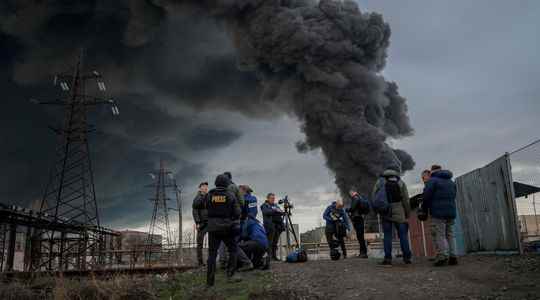“The whole region of kyiv has been liberated from the invader”, it is with these words tinged with immense relief and great pride that the Ukrainian Deputy Minister of Defense, Hanna Maliar, wrote on her Facebook account, announced a news that Ukrainians have been waiting for. Russian troops are rapidly withdrawing from key towns near the capital and in the north of the country, in order to redeploy to the east and south. Why such a decision on the part of Putin’s forces? Does this mark the beginning of the end of this war?
“The Russians understood that they could no longer act on several fronts at the same time”, explains to L’Express Galia Ackerman, historian specializing in post-Soviet Russia. “Their perception of reality was bad, Ukraine did not fall like a ripe fruit and the conquest can now only be done one territory after another”.
Conquering the East and the South, a new stated objective
Maintaining control of the occupied territories and extending its zone of conquest to the East and the South, such seems to be Moscow’s new strategy. Thus, the Russians should concentrate their forces on the cities of Mariupol, Mikolaiv and Odessa, in order to ensure territorial continuity with the Donbass region and cut off Ukraine’s access to the Sea of Azov and to the black Sea.
“We come back to this idea of a” new Russia “, fantasized after the annexation of Crimea in 2014 and which consists, among other things, in conquering the entire Donbass region”, notes Galia Ackerman. This “priority tactic”, in the words of Mykhaïlo Podoliak, adviser to the Ukrainian president, is unacceptable for Ukraine since it would amputate about 40% of its territory.
Expanding its positions in the Donbass and southern Ukraine would strengthen Russia in the peace talks, which the Kremlin seems willing to push forward, having even “verbally” accepted the terms offered by the Ukrainian government to end the war. But the creator of the “Desk Russia” site tempers possible optimism: “What Russia has conquered since the beginning of the war constitutes for it its new frontiers, but President Zelensky does not even seem to have the intention of recognizing the loss of Crimea”. A short-term peace agreement therefore remains very unlikely.
Potential war crimes before withdrawing
The repositioning of the Russian forces in no way indicates that the bombardments will cease on the liberated cities or that other attacks will not be carried out there later. The relief of the populations is therefore mixed with caution, especially since war crimes were allegedly committed by the Russian soldiers before their departure. The localities of Irpin, Boutcha and Gostomel report the presence of dozens of corpses of civilians strewing the roads. Some victims, like at Irpin, had their hands tied behind their backs, the hallmark of an execution.
In Boutcha, northwest of kyiv, nearly 300 people had to be buried “in mass graves”, says mayor Anatoly Fedorouk. “All these people were shot, killed with a bullet to the back of the head,” he said. “We don’t know if Putin asked them to behave like that, in any case he didn’t tell them not to do it,” says Galia Ackerman. “This is in line with the despicable behavior of the Russian military since the start of the invasion.”
Vengeance of soldiers or order of the Kremlin, the Ukrainian government denounced this Sunday April 3 a “deliberate massacre”, as a new damning fact for Russia in the investigation that the International Criminal Court has been carrying out since March 2 on war crimes. allegedly committed by the Russian army on Ukrainian territory. On the ground of horror, withdrawal is not on the agenda.
